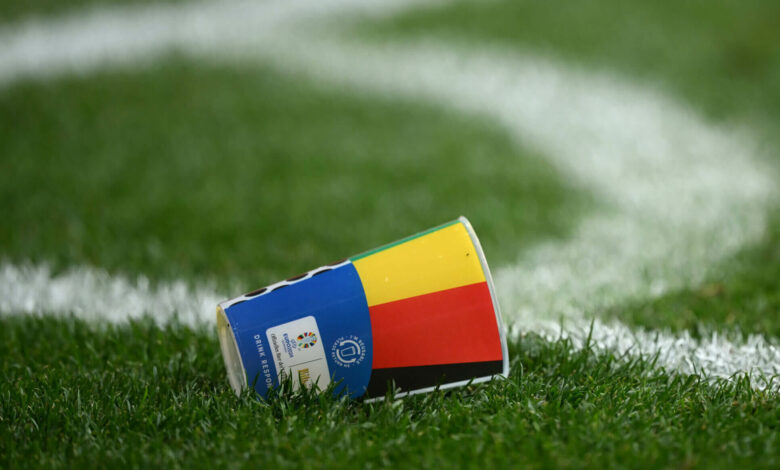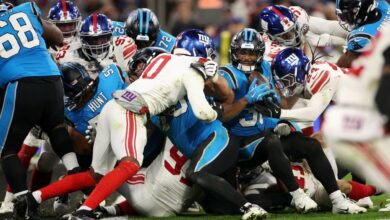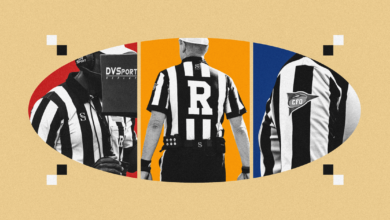Beer, Euro 2024 and all those cups – what’s going on?

The European Championships are drenched in beer. In the fan zones and outside the stadiums. In the halls and on the stands.
Everyone is soaked. Fans, players and, to the great amusement of anyone not wearing a lanyard, journalists, who have hidden laptops and are streaming into press conferences dripping with drink.
Take the small violins. Possibly a towel.
We also need to talk about the plastic cups that fall from the stands in the direction of everyone taking a corner kick or goal kick.
But first the beer.
The official sponsor of the tournament is Bitburger, the German brewer, and the concourse bars are stocked exclusively with their products. For games in the Allianz Arena, for example, Pils, Radler and a non-alcoholic beer cost €7 for 500ml. For games in Cologne, at the RheinEnergieStadion, they have served Kolsch, the sweet beer that is usually served in small, cylindrical glasses. There are no limits on how much people can buy, and fans can drink anywhere in the stadium.
With exceptions.
At England’s group match against Serbia in Gelsenkirchen, only beer with two percent alcohol was served, compared to the usual 4.8 percent. The fixture was considered high-risk. Other special measures were also taken, including a ban on drinking in the stands. It is unclear at this stage whether England’s match against Slovakia on Sunday in Gelsenkirchen will be subject to the same restrictions.
But even with that lower alcohol content, most travelling supporters enjoy a different level of freedom when it comes to drinking than they do at home.

Lower alcohol beer for sale in Serbia – England (Matthias Hangst/Getty Images)
Since 1985, supporters attending Football League matches in England have not been allowed to drink alcohol ‘within sight of the pitch’. In Scotland the rules are even stricter: no drinking at all in stadiums.
In Spain, only non-alcoholic beer is allowed. In France, there is no sale of alcohol in the stadium for Ligue 1 matches. In Serbia, bars around stadiums are only allowed to serve alcohol up to two hours before kick-off.
And then there’s Germany.
UEFA’s approach to organizing tournaments is to adapt food and drink rules to local legislation, and in Germany alcohol is a big part of Bundesliga matchdays. Restrictions could apply during high-risk matches, as happened at Euro 2024, which is not unheard of, but there would be something fundamentally un-German about not being able to watch football with a drink in hand.
Of course, clubs make a lot of money from beer sales; almost all clubs in the top two divisions have a brewery as a sponsor. Schalke’s Veltins Arena, for example, has a 5km-long pipeline connecting the stadium to a local brewery. So on any given weekend, beer is gushing out of the German stands. Watch Borussia Dortmund’s Yellow Wall when a goal is scored; in the right light and from the right angle, it can look like the entire stand is weeping with joy.
There was fear about this subject. For example, before English fans traveled to Germany, the British Foreign Office warned about the strength of German beer. But concerns about overconsumption have not really materialized so far. Few arrests have been made and although many supporters enjoyed long days in sun-drenched beer gardens, there have been few problems.
The Athletics spoke to a steward at the Allianz Arena on Tuesday evening. He said he and his team had encountered few behavioral issues during the tournament so far. They had been vigilant. So far so good, despite strong alcohol being served at the Munich matches, none of which were considered high risk.
The plastic cups are annoying, though, and they’re everywhere — even at press conferences. On Tuesday night, Dragan Stojkovic was asked whether Serbian fans throwing them at Danish goalkeeper Kasper Schmeichel had created an unnecessary distraction, contributing to his team’s elimination after a goalless draw.
“Please ask me about football,” Stojkovic pleaded.

A glass of beer arrives as Schmeichel takes a goal kick against Serbia (Carl Recine/Getty Images)
So far, three countries have been fined for throwing objects onto the pitch by fans – Croatia, Scotland and Albania – with more to come. When France played the Netherlands in the group stage, Antoine Griezmann had to dodge a shower of beer cups as he took a corner. Against Switzerland, Germany’s Toni Kroos was similarly bombarded in the first half in Frankfurt, as was Italy’s Lorenzo Pellegrini against Croatia.

GO DEEPER
Why Toni Kroos ignored progress and stuck with his old Adidas shoes
Before that match in Leipzig, some fans and journalists in the lower tiers were hit from above by plastic cups. Later, the ball actually hit a ball that had landed on the pitch. When Schmeichel was targeted on Tuesday night, in the incident Stojkovic was asked about, substitute Yussuf Poulsen had to help clear the penalty area.
When Gareth Southgate approached the fans after England’s 0-0 draw with Slovenia, they responded with cheers and plastic. The English Football Association can expect a fine by post.
Is UEFA planning action?
When asked about the beer cups from The Athletics on Tuesday, a spokesperson said they would wait for full reports before making any decisions. Something is stirring, but we don’t know exactly what yet.
Plastic cups are generally not such a nuisance in Germany. In March 2022, a match between Bochum and Borussia Mönchengladbach was abandoned after an assistant referee was hit on the head with a beer cup. In 2023, a 3.Liga match between Zwickau and Rot-Weiss Essen was stopped at half-time when a referee got a beer in the face. But such incidents are rare, which may be partly due to changes in the law.
In 2023, many German stadiums began a campaign to use reusable cups. In participating stadiums, fans pay a deposit for a cup outside the stadium and can get it back by returning their cup after the match. Bayern Munich has had such a policy since 2018-19, but many other clubs have adopted it in the years since. The environmental impact is one consequence. The eagerness of fans to hold on to their cups and their deposit is another.
The atmosphere at the Euro 2024 matches has been excellent so far, with fans – apart from a few cases – enjoying the togetherness. They have filled stadiums and city centres with noise and joviality and, although there have been flashes of hostility, the prevailing mood has been one of goodwill and friendly rivalry.

A Belgian fan prefers a helmet over the tournament’s plastic cups (Stu Forster/Getty Images)
Given that it has been many years since a football tournament has taken place on mainland Europe without Covid-19 restrictions, that is a distant memory. Many seem to be treating the tournament as a holiday, with a determination to make the most of the experience, despite some tiring organisational issues, especially on the opening days.
Supporters tend to only make headlines when they behave badly. At this tournament, where there have been dramatic improvements but where queues and delays still exist, they deserve to be recognised for what they have made Euro 2024 into. Colourful, atmospheric, festival-like.
The freedom to enjoy is also part of this.

GO DEEPER
When the Balkans came to Euro 2024: chants, flags and why Serbia threatened to withdraw
(Top photo: A plastic cup on the pitch during the match between Slovenia and Serbia; by Clive Mason via Getty Images)




